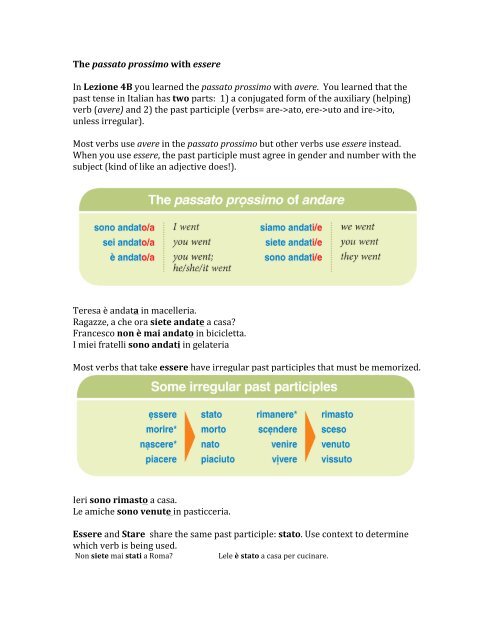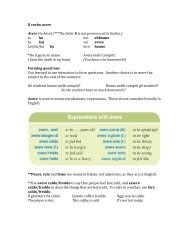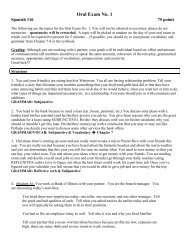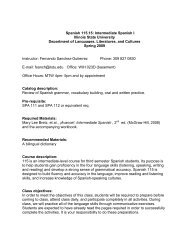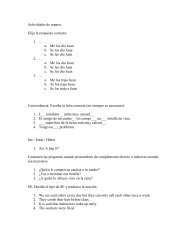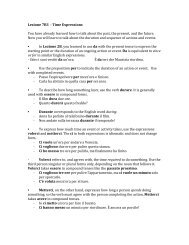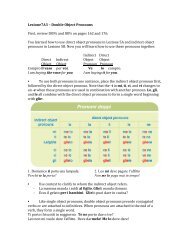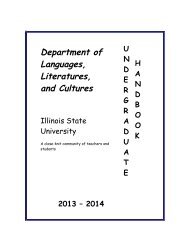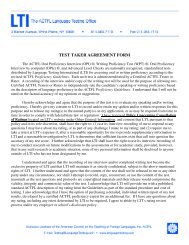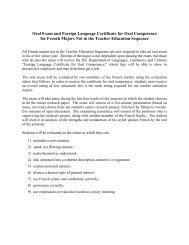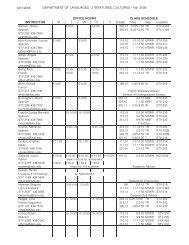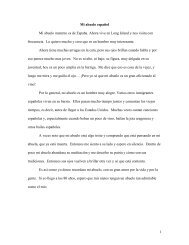The passato prossimo with essere In Lezione 4B you learned the ...
The passato prossimo with essere In Lezione 4B you learned the ...
The passato prossimo with essere In Lezione 4B you learned the ...
Create successful ePaper yourself
Turn your PDF publications into a flip-book with our unique Google optimized e-Paper software.
<strong>The</strong> <strong>passato</strong> <strong>prossimo</strong> <strong>with</strong> <strong>essere</strong> <strong>In</strong> <strong>Lezione</strong> <strong>4B</strong> <strong>you</strong> <strong>learned</strong> <strong>the</strong> <strong>passato</strong> <strong>prossimo</strong> <strong>with</strong> avere. You <strong>learned</strong> that <strong>the</strong> past tense in Italian has two parts: 1) a conjugated form of <strong>the</strong> auxiliary (helping) verb (avere) and 2) <strong>the</strong> past participle (verbs= are-‐>ato, ere-‐>uto and ire-‐>ito, unless irregular). Most verbs use avere in <strong>the</strong> <strong>passato</strong> <strong>prossimo</strong> but o<strong>the</strong>r verbs use <strong>essere</strong> instead. When <strong>you</strong> use <strong>essere</strong>, <strong>the</strong> past participle must agree in gender and number <strong>with</strong> <strong>the</strong> subject (kind of like an adjective does!). Teresa è andata in macelleria. Ragazze, a che ora siete andate a casa? Francesco non è mai andato in bicicletta. I miei fratelli sono andati in gelateria Most verbs that take <strong>essere</strong> have irregular past participles that must be memorized.Ieri sono rimasto a casa. Le amiche sono venute in pasticceria. Essere and Stare share <strong>the</strong> same past participle: stato. Use context to determine which verb is being used. Non siete mai stati a Roma? Lele è stato a casa per cucinare.
Essere is used <strong>with</strong> verbs in <strong>the</strong> <strong>passato</strong> <strong>prossimo</strong> that express states of being or changes of state. Provalo! Completa ogni frase con il participio <strong>passato</strong> corretto. 1. Voi siete (nato / nate) nel 1970. 2. Vi è (piaciuto / piaciuta) il film? 3. Gli studenti sono (andate / andati) al museo. 4. Tu sei (tornato / tornate) a casa alle due di notte. 5. Ragazzi, davvero siete (rimasti / rimaste) in piscina tutto il giorno? 6. Sono molto triste perché ieri è (morta / morto) il mio pesce. 7. Ida e Adamo sono (restata / restati) a cenare a casa mia. 8. Tu e Mirella siete (arrivato / arrivate) in Italia il quattro giugno. Creare! Riscrivi ogni frase usando il <strong>passato</strong> <strong>prossimo</strong>. 1. Mi piacciono molto i broccoli con il formaggio. 2. Il pane diventa secco dopo due giorni. 3. La macelleria rimane aperta questa domenica. 4. La crostata viene sempre bene. 5. La carne e le uova costano troppo. 6. I signori Cefaletti vanno alla pasticceria.


